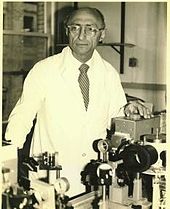Martin Pope
Martin Pope (born August 22, 1918 in New York City ) is an American chemist. He is a pioneer in molecular semiconductors.
Pope is descended from Jewish-Polish immigrants, grew up in the Lower East Side and graduated from the City College of New York with a bachelor's degree in 1939. During World War II he worked at Columbia University in the area of the Manhattan Project and served as a lieutenant in of the Army Air Force in the Pacific. After returning to New York, he worked on thin films at Balco Research Laboratories. He received his PhD in chemistry from the Polytechnic Institute of Brooklyn in 1951 . 1951 to 1956 he was Assistant Technical Director of Balco Research Laboratories. In 1956 he went to New York University at the Radiation and Solid State Physics Laboratory (RSSL), where he became professor of chemistry and was director from 1983 until his retirement in 1988.
In 1960 he developed ohmic electrode contacts for injecting charge carriers into organic crystals and in 1963 they observed electroluminescence in anthracene . This and other work by his group formed the basis for organic light-emitting diodes (OLED).
In 1977 he became a Fellow of the American Physical Society . In 2006 he received the Davy Medal . Among other things, he was visiting professor in China, the USSR and Egypt (Alexandria).
He married Lillie Pope , née Bellin, in 1946 and has two daughters. Lillian Pope (* 1918) is a well-known developmental psychologist, especially for children with learning disabilities.
Fonts
- with Charles E. Swenberg Electronic processes in organic crystals , Oxford University Press 1982, new edition 1992 as Electronic Processes in Organic Crystals and Polymers
Web links
Individual evidence
- ↑ Life data according to American Men and Women of Science , Thomson Gale 2004.
| personal data | |
|---|---|
| SURNAME | Pope, Martin |
| BRIEF DESCRIPTION | American chemist |
| DATE OF BIRTH | August 22, 1918 |
| PLACE OF BIRTH | New York City |
